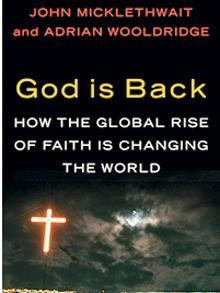Michael Duffy titles his review, ‘The modern world depends on God’ because he identifies this as a basic tenet of the fascinating,
God Is Back, a recent book by John Micklethwait, the editor of The Economist, and Adrian Wooldridge, the magazine’s Washington bureau chief. It is a rebuttal of the idea, still powerful after two centuries, that religion is incompatible with modernity and the future will be secular. And it argues that one of the most successful types of religion at the moment is market-influenced, American-style Protestantism.
Because church and state have been separate in America since the revolution, churches have had to compete for adherents. This has led many to embrace marketing techniques (such as advertising and market research) and technology to a far greater extent than churches in countries that have some degree of state support. As a result, they are far more competitive and entrepreneurial, and the consumers respond accordingly: 44 per cent of Americans embrace a brand of Christianity different to the one they were brought up in.
This is interesting, and might provide one answer to the great puzzle of why Christianity has remained more popular in America than in Europe and Australia. Maybe American churches are just better at their job.
Considering the thesis in relation to Islam Christopher Howse is very critical of the book’s thesis. In part,
. . . if one takes the quartet “democracy and markets, technology and reason”, . . it is clear that markets and technology have been adopted with enthusiasm by Islam. Democracy and reason, however, are rejected in favour of ummah (the Islamic community) and sharia (Islamic law). In other words, Islam enjoys a gadget modernity, not a ballot modernity. Its success is a vast disproof of Micklethwait and Wooldridge’s optimistic thesis.
The review by Michael Burleigh invites reflection on the importance of ‘community’ in our church. In part,
Thanks to the defining American Revolution, Christianity has never been encumbered by association with a reactionary social order, the factor that explains the anticlericalism and aggressive secularism that still exists in parts of Europe. Although the authors may underestimate the absence of government social safety nets in America, they are surely right in saying that religion provides an intense and practical community. The clients include new immigrants, for whom churches are like decompression chambers for surfacing divers, as well as poor African-Americans, or middle-class blacks and whites who live in the anomic sprawl of suburbia.
God Is Back: How The Global Rise Of Faith Is Changing The World, by John Micklethwait and Adrian Wooldridge, is published by Allen Lane/Penguin 2009.


